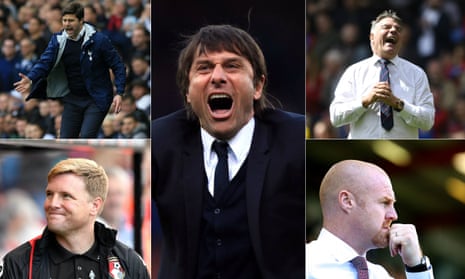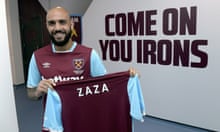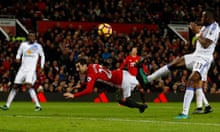Welcome to theguardian.com review of the 2016-17 Premier League season. Now that the campaign has ended we would like you to help us choose your favourite goal, the best referee and the best manager, and other winners in a total of 10 categories. We have nominated some contenders but this is just to get the discussion going: we would like your suggestions so that we can compile the best into final polls that you can vote on. The polls will be published at midday on Wednesday 24 May, so please tell us what you think. Thanks
Antonio Conte
Because if turning a widely-despised team that finished 10th into an only occasionally-despised team that finished first doesn’t get you a place on this list then there’s no sense in the world.
Mauricio Pochettino
Spurs are a brilliantly entertaining, wonderfully organised and excellently motivated team, and though they again missed out on silverware their manager deserves enormous credit for it. Their away record has been a little humdrum, but at home they have been phenomenal, drawing with Liverpool and Leicester and beating every league side whose name does not begin with L. “For me he’s the best or definitely one of the best managers in the world,” said Harry Kane, whose absence with an ankle injury during the draw-heavy period in late Autumn probably decided the title. “Not just on the pitch but off the pitch as well – he’s a great man-manager.” This is particularly evident in the way he has shuffled his four full-backs over the last two seasons, with all of them remaining in excellent form and high spirits until the last few weeks when Kyle Walker, with transfer speculation starting to swirl, became unsettled. The way Hugo Lloris speaks of him – “already the best manager in the world – he matters a lot to me. Our relationship goes beyond football” – is again revealing of the high regard with which he is held by his charges. But the final word goes to Pep Guardiola: “’I don’t think he’s one of the best managers in England, he’s one of the best football managers in the world,” he said in October. “I enjoy watching Tottenham. Not [just] right now. Since last year. I think what he’s doing is an amazing job. The way they play I like a lot.”
Sean Dyche
After only a shambolic Hull that at the time had no manager and few players, Burnley were considered the pre-season relegation favourites, yet Dyche has led them on a season of merry mediocrity, earning particularly brilliant results at home. Since the end of August, before which tables don’t really count, Burnley have bounced around happily between 16th place and ninth, while after a 42-year absence from the England team two Burnley players have been capped. As a result of all this, Dyche has been named on the official Premier League manager of the year shortlist: he has only been a manager for six years, has never been employed by a club that could be considered particularly moneyed or glamorous, yet he has been nominated for divisional manager of the year awards in four of them. He may sometimes be overlooked because he’s a croaky-voiced Englishman, but Dyche appears to be really quite good.

Sam Allardyce
When Allardyce was sacked as England manager in September after a humiliating and self-aggrandising – but not really, in hindsight, all that damning – pint-of-wine-drinking outing with some undercover reporters, the likelihood of him appearing on this list appeared extremely remote. It seemed even more unlikely when, having been appointed just before Christmas with a brief to “bring some joy” to Crystal Palace’s disintegrating season, the side won only one of his first eight games, sinking down to 19th in the table. Particularly given that they would have to play every top six side in their final 10 fixtures. Then came a match against Middlesbrough, and a debut for the on-loan Liverpool defender Mamadou Sakho: eight games and six wins later, including victories over Chelsea, Arsenal and Liverpool, the escape was all but complete. Allardyce thus ends the season with a £2m relegation-dodging bonus payout and a manager-of-the-season nomination not so much for his efforts throughout the campaign – three months of which he spent with his feet up – but as the man behind its most eyebrow-raising eight-game hot streak.
Eddie Howe
As Bournemouth played out the final moments of their 1-0 win over West Brom in September, their fans started to sing: “Tony Pulis,” they trilled, “your football is shite.” They did have something of a point. This season’s Bournemouth and West Brom represent two very different answers to the same question, regarding smaller-club top-flight survival techniques. “The bigger clubs have got the money, the skill and the ability,” Pulis said last month. “The smaller clubs in the league who haven’t got the money to buy that skill and ability, you have to work very hard on your organisation. That’s what we have to do. Be very organised and well set up.” The fruits of Pulis’s labour are most evident at set-pieces, at which his side are perhaps the division’s most successful exponents, but from open play they are often prosaic. Howe also talks frequently about hard work, but his teams play a more open game, which is not always to their own benefit – take the madcap 6-3 defeat at Everton, which contributed to them conceding more league goals this season than anyone but Hull and Swansea – but normally is to a neutral’s. “I’m studying Bournemouth and I’m watching a good team with good organisation,” Antonio Conte said before his Chelsea met the Cherries on Boxing Day. “They always try to play from the back and put good pressure. If he continues in this way for sure he can become a manager of a great team.” Bournemouth have struggled at times this season, most particularly in a run of three draws, five league defeats and a 3-0 FA Cup humbling at Millwall between the turn of the year and the second week of March, but the absolute ease with which they avoided any hint of relegation in what was expected to be a difficult second season in the top flight makes this in retrospect another fine season for Howe (as it was, in his way, for Pulis).










Comments (…)
Sign in or create your Guardian account to join the discussion